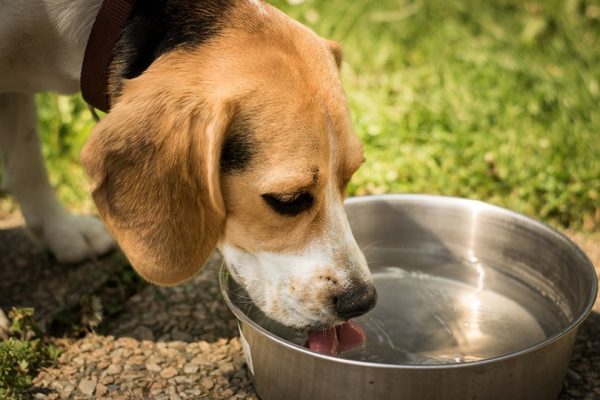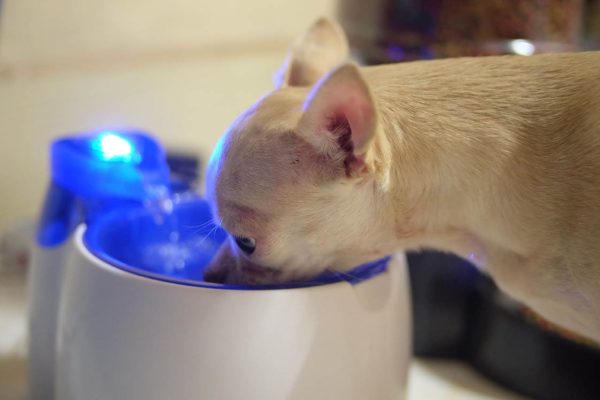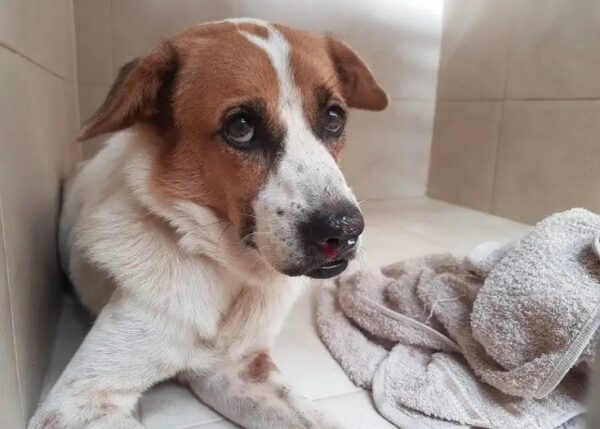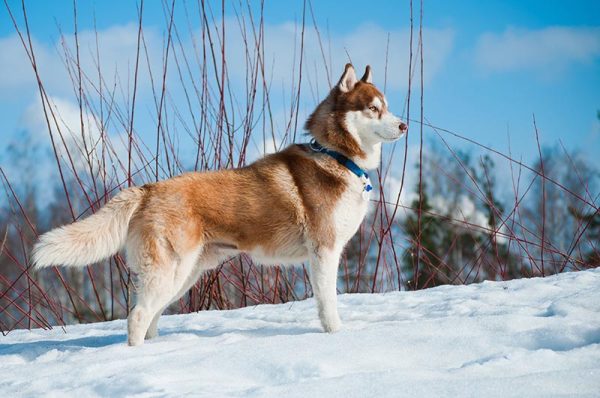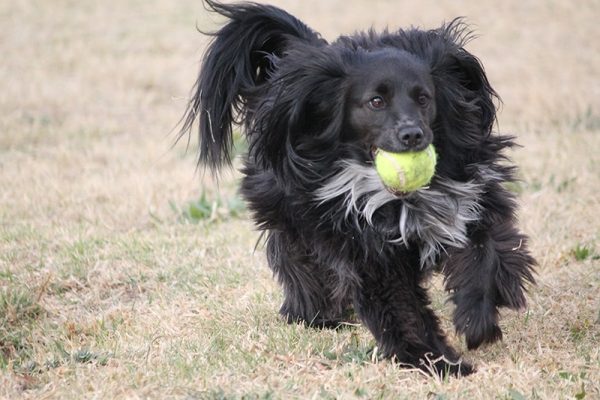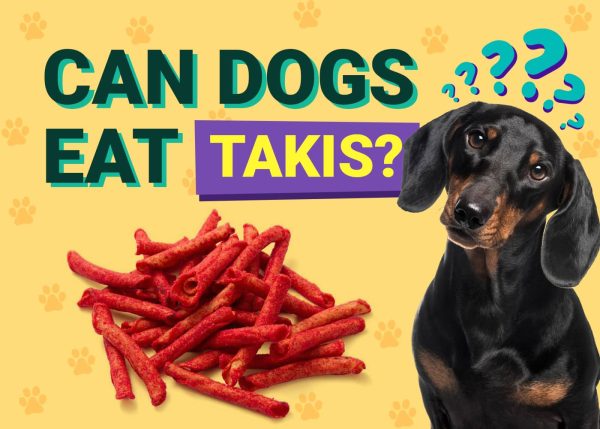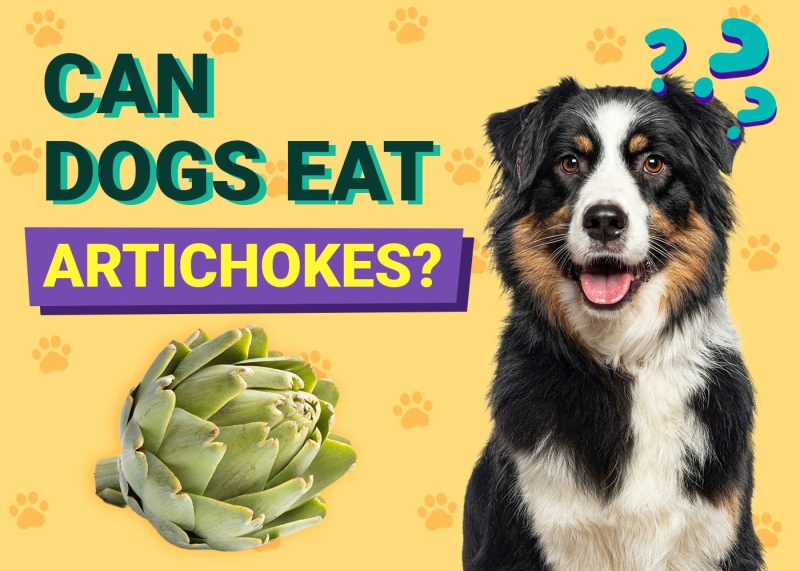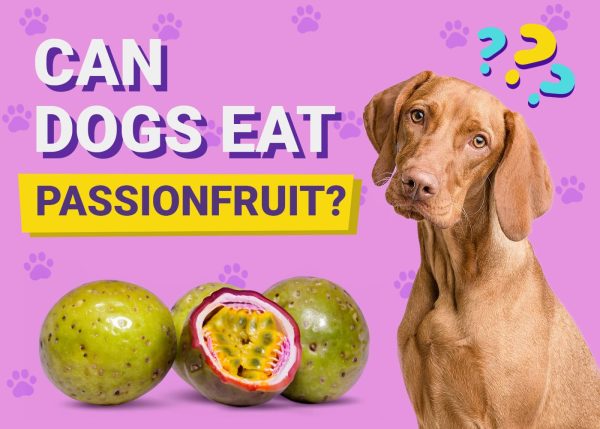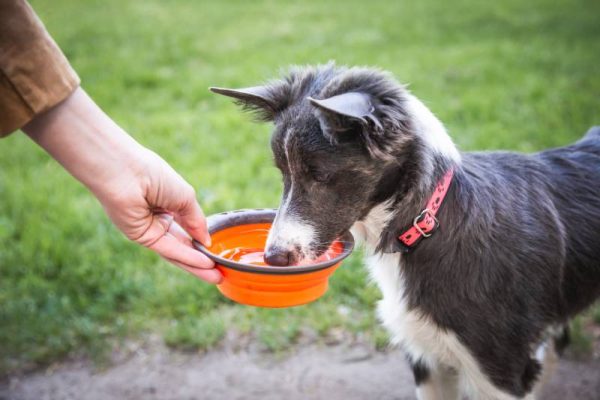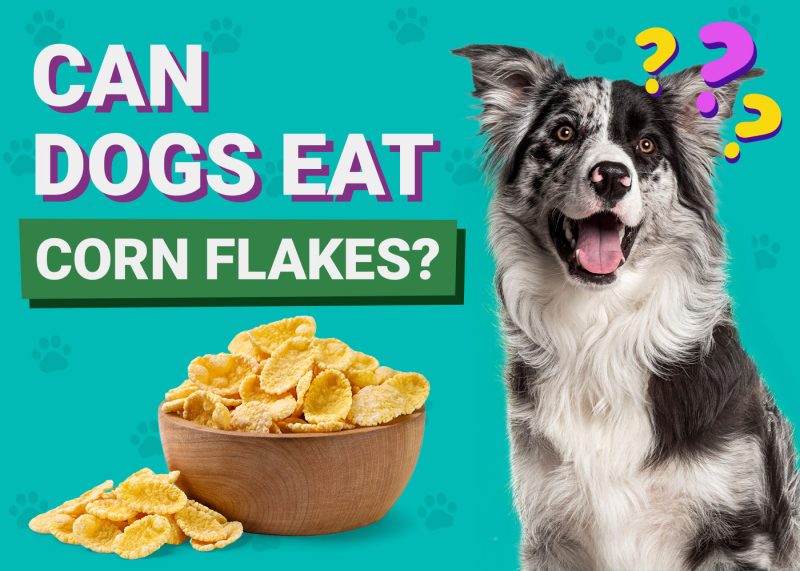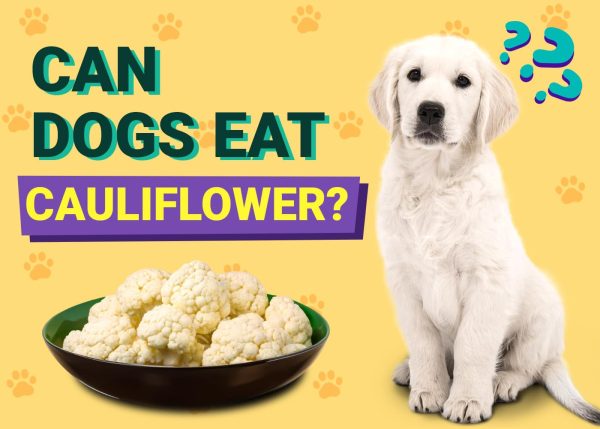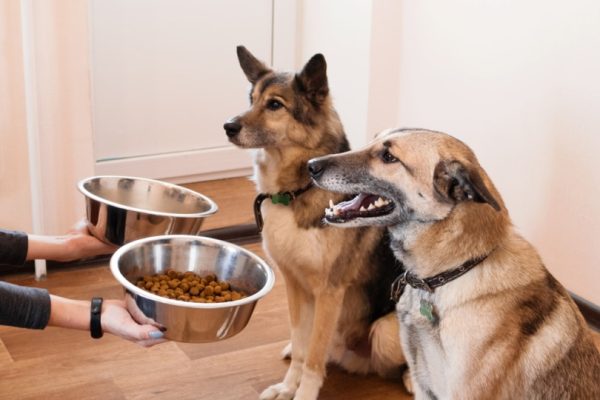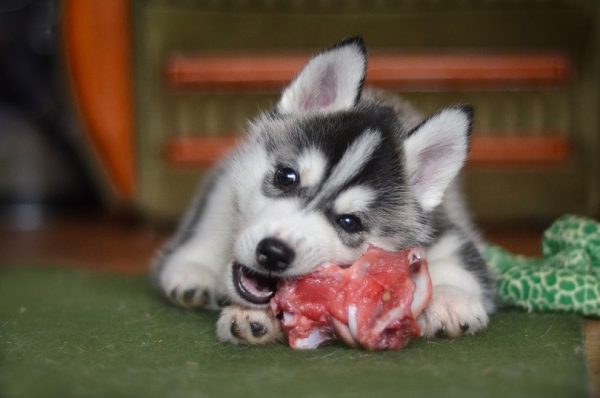In this article
View 4 More +You’re finished with your plate, but you still have a bunch of stuff you don’t feel like scraping off into the trash. Since you have a living, breathing garbage disposal in your house, you might just throw it down and let your dog lick the leftovers right off. Or maybe you left your plate unattended for just a second, and came back to find your dog licking up what’s left of the food.
But this can be dangerous to dogs. Why? In this article, we’re going to explore all of the considerations you should make before letting Fido lick your plate.

Licking the Plate—Seems Harmless Enough Right?
Letting your dog lick the plate can seem like it’s really no big deal. After all, they enjoy a good snack just like anybody else. But it’s definitely a multifaceted situation. There are certain instances where it might be okay to let your dog take a little sample, but definitely situations that you should steer clear of.
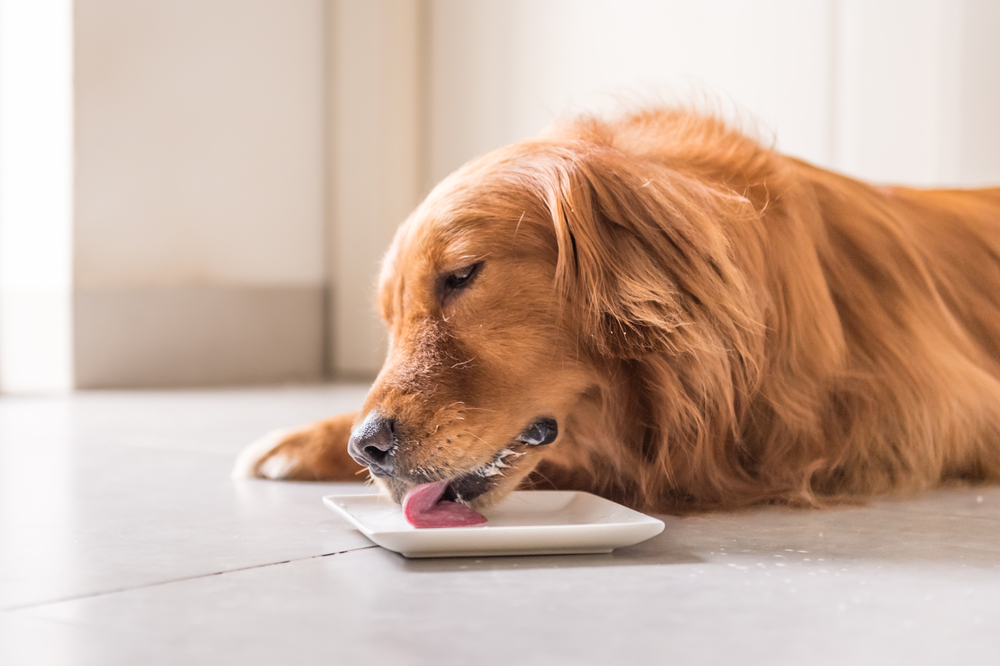
Ultimately, it’s up to you if you want to give your dog your dinner plates once you’re done eating. We can’t tell you what to do. But we can say that we don’t advise you to let your dog lick your plate.
It seems in this particular situation, the cons outweigh the pros and it’s just really not worth the risk. If this has been a practice you’ve engaged in since your pup was little, they’re likely already really used to it, but it doesn’t necessarily mean it’s healthy for them still.
Below are a few things you should consider about sharing your dinner plates with your dog.
Dogs Have Lots of Germs in Their Mouth
Dogs have lots of bacteria in their mouths—just like humans, However, the transference between plates has the potential to infect humans with unwanted bacteria, like Salmonella.
We’ve all heard of raw meat, reptiles, recalled foods, and unwashed veggies having Salmonella—but a dog’s mouth? It is totally possible for their saliva to carry it, especially in dogs that are raw fed, and this bacteria can survive for up to 32 hours on surfaces.1
- Diarrhea
- Vomiting
- Lethargy
- Fever
Naturally, thoroughly washing dishes will remove most bacteria from the surface. But if you were hurrying through dishes that night and didn’t give them the full treatment, there is the potential risk of bacteria remaining.
In addition, have you seen some of the things your dog is willing to stuff down their gullet? Yucky! Dogs are constantly getting into the garbage, picking up dead things outside, and even eating poop of other animals!
So, you have to ask yourself, is that a tongue you really want sliding across your plate? Probably not. Even a particular picky or clean pup could have dental issues and other grotesque bacteria lingering in their mouth.
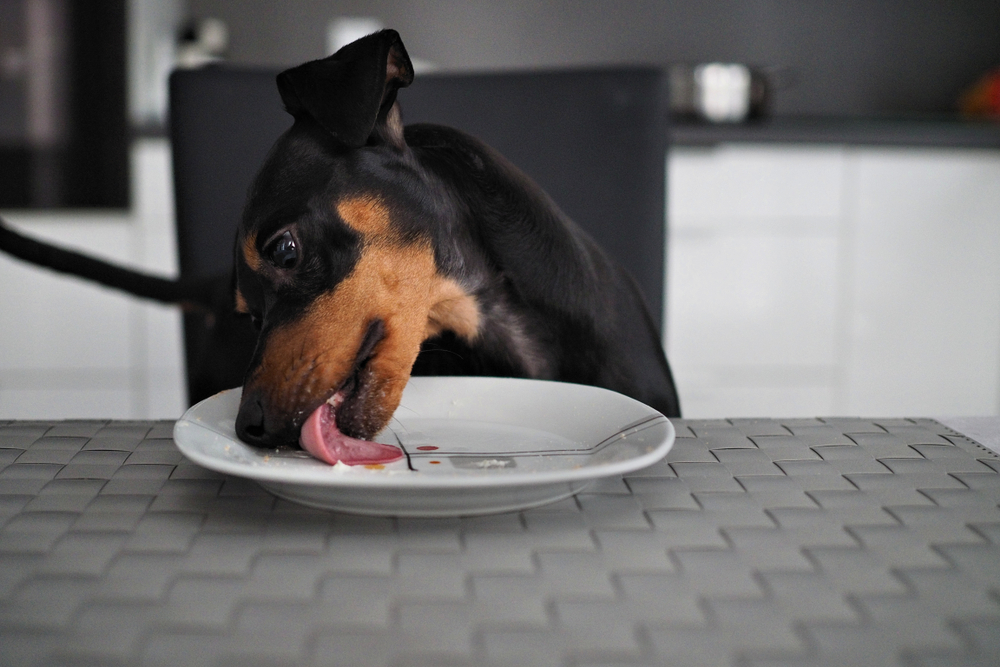
Some Human Food Is Toxic to Dogs
It would be so nice if you could just prop your dog up at the dinner table and let them enjoy the family meal you’ve prepared. Unfortunately, even though dogs are omnivores, they don’t share the same diet we do—and shouldn’t try to.
Many human foods are toxic to dogs. Even more, human foods can be just irritating enough to have problematic consequences. Often, as we cook, we don’t think about the spices, seasoning, and other ingredients we added to the backyard barbeque, that often get left behind on the plate even if the bulk of the food is gone.
- Garlic
- Onion
- Leeks
- Chives
- Chocolate
- Avocado
- Uncooked bread dough
- Xylitol
- Raisins/grapes
- Rhubarb
- Macadamia nuts
- Allspice
- Bay leaf
- Cloves
- Hops
- Marjoram
- Mustard seed
- Excess salt
- Nutmeg
- Fruit pits
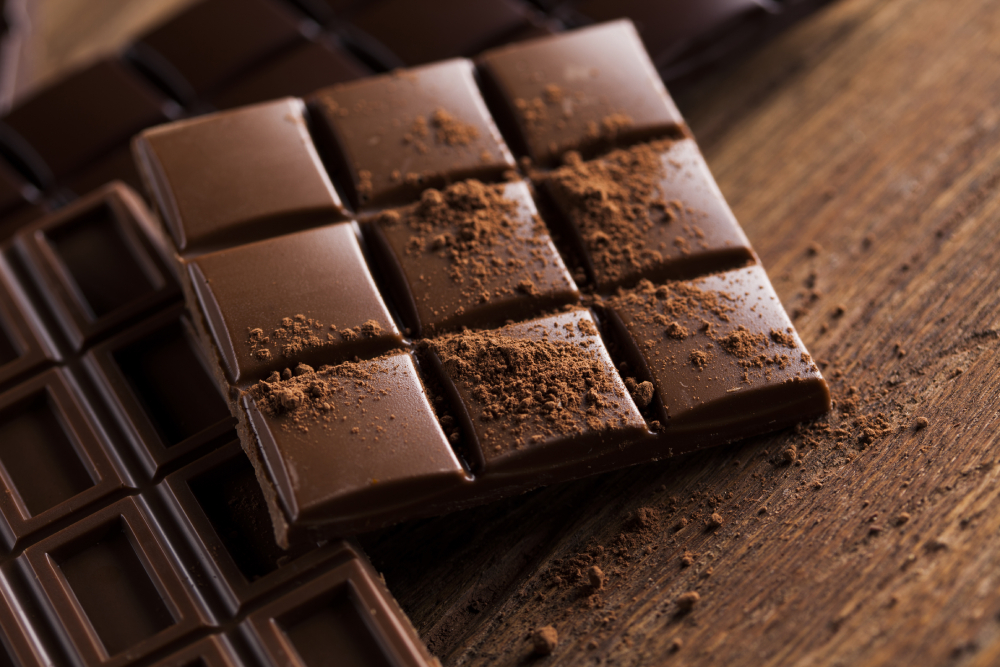
Dogs Can Have Food Sensitivities and Allergies
Our dogs have sensitive digestive tracts—and some will be much touchier than others. If you already have had to switch dog foods a few times or your dog has any known issues, they are an especially bad candidate for plate cleanup duty.
- Protein source (the most common food allergens in dogs are proteins)
- Fatty foods
- Dairy
- Eggs
So, just remember what’s on the plate before you put it in front of your dog.
Human Food Just Isn’t Healthy
We have a very diverse palette. We are constantly cooking, preparing, and serving meals that have all sorts of different ingredients. Our dogs, however, don’t need any of the same fancy thrills we have when we eat our food. They have different dietary requirements than we do also.
Even though we’re both omnivorous creatures, dogs generally require more protein content in their diet and definitely less sugar. Your dog should be getting all their essential nutrients from their balanced dog food, and if we’re constantly letting our dogs consume additional human food, we could contribute to potential disease and issues like obesity.
So much the same as you shouldn’t give your dog table scraps, licking the plate clean really isn’t good long-term either.

So, Should Dogs Lick Plates?
Again, ultimately the decision is yours on whether you will be sharing your dinner plate remnants with your pooch. We just don’t think it’s worth the potential risks to either party.
If you do end up sharing plates with your dog, make sure that you are thoroughly washing them afterward. These plates will require very hot water and antibacterial washing. These are certainly not the kinds of plates you can just wipe off, rinse off, and place on the drying rack.
In fact, most plates licked by dogs would be much better off thrown through a dishwasher where they could be completely disinfected. As for your dog, remember not to give them anything that could potentially be toxic or irritating to their system.

Conclusion
So now you understand that there could be a few dangers associated with giving dogs plates to lick. It can transfer bacteria, irritate your dog’s stomach, or even make them very sick.
If you choose to share plates with your dog anyway, make sure that your plate doesn’t contain any potentially harmful ingredients and make sure that you completely sanitize the dishes afterward.
Featured Image Credit: Lazy_Bear, Shutterstock


